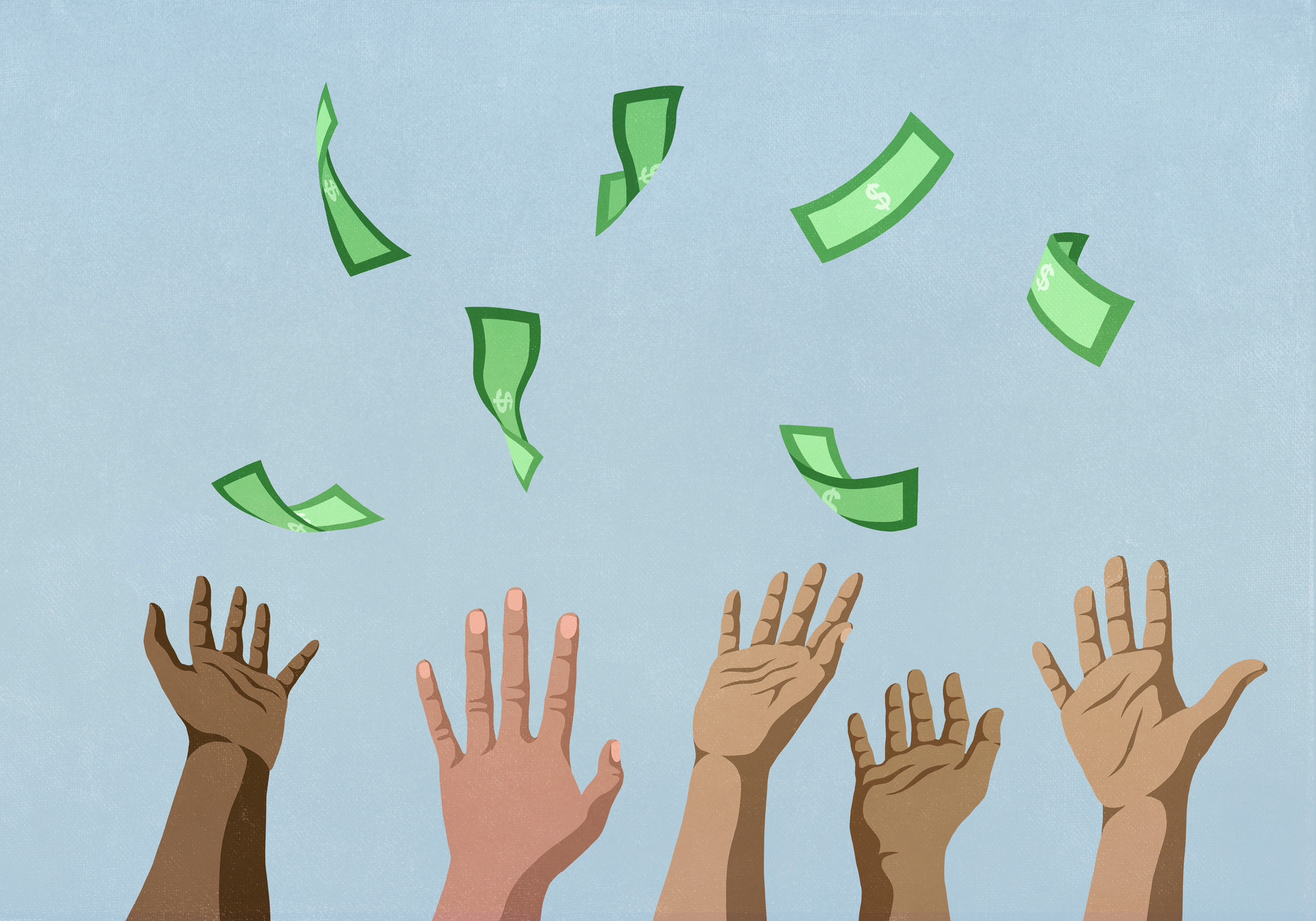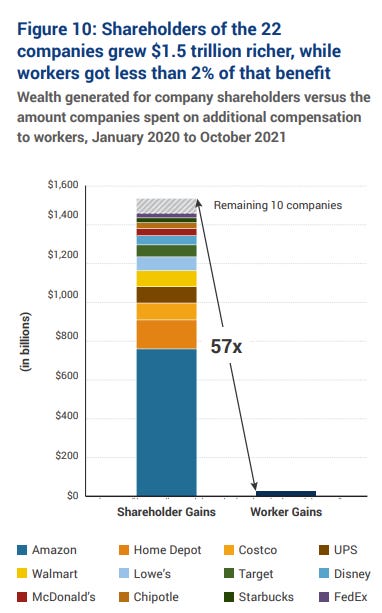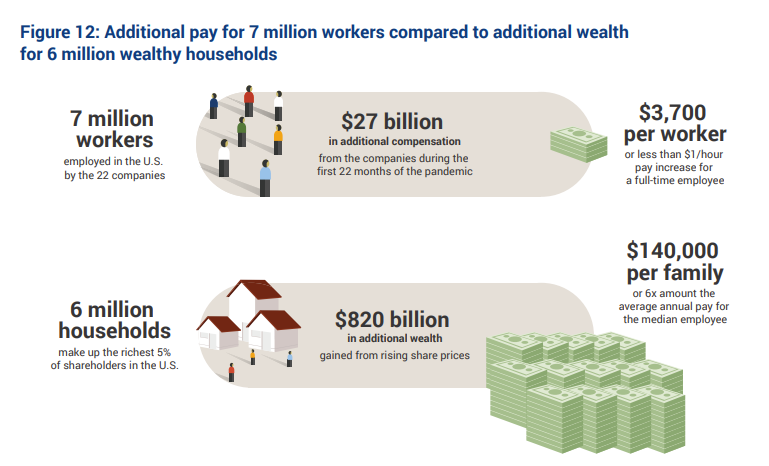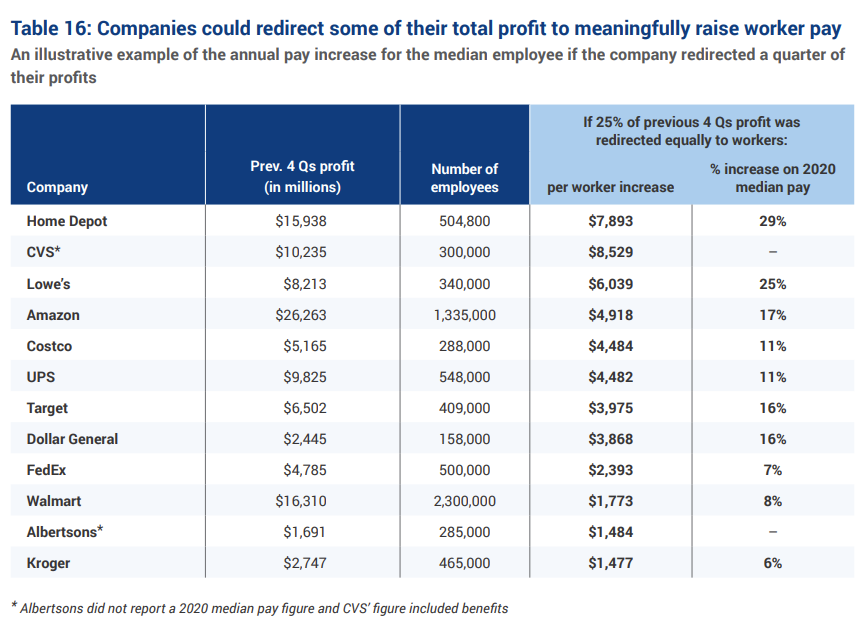Corporations get massive pandemic windfall, stiff workers
Too often, the media treats the news as a game. It's about who is up and who is down — who is winning and who is losing. Popular Information takes a different approach. We believe journalism should focus on people. We believe that at its best, journalism can have a positive impact on people's lives by holding the powerful accountable. That is the focus of today's edition. And it will continue to be the focus of Popular Information in the months and years to come. Our reporting has helped secure guaranteed sick leave for 170,000 restaurant workers, pressured large corporations to cut off donations to members of Congress who voted to overturn the election, pushed Koch Industries to wind down its business in Russia. You can support this work — and help us do more of it — by becoming a paid subscriber. If the cost of this newsletter ($6/month or $50/year) would create any kind of financial strain, please stay on this free list. That's why we've taken down the paywall. But if you can afford it, consider becoming a paid subscriber. For most Americans, the COVID-19 pandemic has been a traumatic experience. Nearly 1 million Americans have died. Millions more lost their jobs. And nearly everyone had their daily lives upended dramatically. But for a number of large corporations, the pandemic has created an unprecedented windfall and record profits. These profits would not have materialized without frontline workers, who put their lives at risk to keep companies operating and the economy functioning. In the end, however, corporations chose to use almost all of that extra cash to reward shareholders and executives, according to a new study by Brookings. Workers, comparatively, received almost nothing. The Brookings study looked at performance of 22 major corporations, which collectively generated an additional $1.5 trillion in wealth for shareholders between January 2020 and October 2021. That was 57 times more than the additional wages provided to the workers whose labor generated that wealth. Those 22 corporations employ about 7 million workers. Those workers collectively received $27 billion in additional pay during the first seven quarters of the pandemic. That sounds like a lot, but it amounts to about $3700 per worker or a less than $1 per hour increase for a full-time employee. Conversely, the richest 5% of households — the 6 million households that hold a large majority of stock in the United States — saw their wealth increase by $140,000 per family due to the rising stock prices of those companies. Brookings identified a subgroup of 12 major companies that "won" the pandemic: Albertsons, Amazon, Costco, CVS, Dollar General, FedEx, Home Depot, Kroger, Lowe's, Target, UPS, and Walmart. These are all businesses that benefited from the shift to eating at home and shopping online. As the pandemic wanes, these companies are poised to continue to benefit from permanent shifts in consumer behavior. From January 2020 to November 2021, these 12 companies saw their profits increase "$56.1 billion, or 45%, compared to the previous seven quarters." Very little of this extra cash made its way to workers. Workers at two of the "winning" companies, Dollar General and UPS, received no additional pay in 2020 for working during a deadly pandemic. Home Depot offered the most additional pay, a $3500 bonus for full-time workers, which amounted to a 13% pay increase. The average temporary pay increase among these companies was just 6%. Due to a tight labor market, every company in the "winning" group except Lowe's and Dollar General raised their hourly wages over the course of the pandemic. But, due to inflation, the increase in real wages was quite small. Kroger, for example, increased its average hourly wage from $15 per hour in January 2020 to $16.25 per hour in October 2021. That's an 8% nominal increase but, due to inflation, only a 1% increase in real wages. As of October 2021, "the living wage would be $17.70 per hour, or just under $37,000 annually." Workers who get assigned less than 40 hours per week, which is common in the service sector, would need to make even more. Only four of the twelve companies that saw their profits explode during the pandemic — FedEx, UPS, Costco, and Amazon — currently pay at least half of their workers a living wage. "In general, worker pay is still far too low, compared to either a living wage or company financial performance; shareholders reaped tremendous rewards while workers shared only minimally in company success," the Brookings study conclude. Corporate prioritiesThe fact that a small percentage of Americans benefit from rising stock prices is outside of any one corporation's control. It reflects the fundamental inequality in the United States where a relatively tiny number of households own most of the stock. But corporations do control how they spend their own money. The 22 companies included in the Brookings study spent $49 billion on stock buybacks during the first six quarters of the pandemic.(Six companies — Amazon, CVS, Disney, Hilton, Marriott, and Starbucks — suspended stock buybacks during this time period.) If those funds had been diverted to worker pay instead, these companies could have increased wages by almost 40%, from an average of $23,707 to $32,705, without impacting profitability. Public companies need to make a profit, but could have chosen a more equitable balance between profitability and improving worker pay. Devoting just 25% of record annual profits at the 12 "winning" companies to worker pay could have a meaningful impact. It doesn't have to be this wayOne might dismiss the inequitable distribution of the pandemic windfall as the inevitable result of capitalism. But, as the Brookings report notes, it wasn't always this way:
Corporate America has implicitly acknowledged it has lost its way. The Business Roundtable, a lobbying organization that represents the CEOs of virtually every major American corporation, issued a statement in August 2019 that "redefines the purpose of a corporation." According to the statement, corporations exist to promote "an economy that serves all Americans." The statement says that corporations don't exist merely to generate returns for shareholders. Rather, corporations are "committed to all stakeholders." This includes customers, employees, suppliers, and the broader community. Americans, the statement said, "deserve an economy that allows each person to succeed through hard work and creativity and to lead a life of meaning and dignity." Specifically, the statement pledged to invest in employees and "move away from shareholder primacy." The pandemic provided an early test of this commitment and nearly every corporation that signed the Business Roundtable statement failed. |
Older messages
Musk is a "free speech absolutist" except when he's not
Tuesday, April 26, 2022
Elon Musk, the richest man in the world, bought Twitter yesterday for about $44 billion. "Free speech is the bedrock of a functioning democracy," Musk said in a press release announcing the
Toyota's second U-turn
Monday, April 25, 2022
Shortly after January 6, 2021, Toyota announced that it would reassess "our future PAC criteria" in light of "the horrific attack on the US Capitol." That review did not last long.
UPDATES: Koch exits, DeSantis responds
Friday, April 22, 2022
For the last five weeks, Popular Information has reported extensively on Koch Industries, the corporation owned by right-wing billionaire Charles Koch, and its decision to continue business in Russia.
Inside the "dangerous" math textbooks DeSantis claims would "indoctrinate students"
Thursday, April 21, 2022
On April 15, the Florida Department of Education issued a dramatic press release: "Florida Rejects Publishers' Attempts to Indoctrinate Students." In the release, Florida Commissioner of
Passing the mic [CORRECTED]
Wednesday, April 20, 2022
Apologies for the multiple emails this morning. Due to a technical error, the previous version did not have a link to the discussion thread. — J…
You Might Also Like
☕ Great chains
Wednesday, January 15, 2025
Prologis looks to improve supply chain operations. January 15, 2025 View Online | Sign Up Retail Brew Presented By Bloomreach It's Wednesday, and we've been walking for miles inside the Javits
Pete Hegseth's confirmation hearing.
Wednesday, January 15, 2025
Hegseth's hearing had some fireworks, but he looks headed toward confirmation. Pete Hegseth's confirmation hearing. Hegseth's hearing had some fireworks, but he looks headed toward
Honourable Roulette
Wednesday, January 15, 2025
The Honourable Parts // The Story Of Russian Roulette Honourable Roulette By Kaamya Sharma • 15 Jan 2025 View in browser View in browser The Honourable Parts Spencer Wright | Scope Of Work | 6th
📬 No. 62 | What I learned about newsletters in 2024
Wednesday, January 15, 2025
“I love that I get the chance to ask questions and keep learning. Here are a few big takeaways.” ͏ ͏ ͏ ͏ ͏ ͏ ͏ ͏ ͏ ͏ ͏ ͏ ͏ ͏ ͏ ͏ ͏ ͏ ͏ ͏ ͏ ͏ ͏ ͏ ͏ ͏
⚡️ ‘Skeleton Crew’ Answers Its Biggest Mystery
Wednesday, January 15, 2025
Plus: There's no good way to adapt any more Neil Gaiman stories. Inverse Daily The twist in this Star Wars show was, that there was no twist. Lucasfilm TV Shows 'Skeleton Crew' Finally
I Tried All The New Eye-Shadow Sticks
Wednesday, January 15, 2025
And a couple classics. The Strategist Beauty Brief January 15, 2025 Every product is independently selected by editors. If you buy something through our links, New York may earn an affiliate commission
How To Stop Worrying And Learn To Love Lynn's National IQ Estimates
Wednesday, January 15, 2025
... ͏ ͏ ͏ ͏ ͏ ͏ ͏ ͏ ͏ ͏ ͏ ͏ ͏ ͏ ͏ ͏ ͏ ͏ ͏ ͏ ͏ ͏ ͏ ͏ ͏ ͏ ͏ ͏ ͏ ͏ ͏ ͏ ͏ ͏ ͏ ͏ ͏ ͏ ͏ ͏ ͏ ͏ ͏ ͏ ͏ ͏ ͏ ͏ ͏ ͏ ͏ ͏ ͏ ͏ ͏ ͏ ͏ ͏ ͏ ͏ ͏ ͏ ͏ ͏ ͏ ͏ ͏ ͏ ͏ ͏ ͏ ͏ ͏ ͏ ͏ ͏ ͏ ͏ ͏ ͏ ͏ ͏ ͏ ͏ ͏ ͏ ͏ ͏ ͏ ͏ ͏ ͏ ͏ ͏ ͏ ͏ ͏ ͏ ͏
☕ Olympic recycling
Wednesday, January 15, 2025
Reusing wi-fi equipment from the Paris games. January 15, 2025 View Online | Sign Up Tech Brew It's Wednesday. After the medals are awarded and the athletes go home, what happens to all the stuff
Ozempic has entered the chat
Wednesday, January 15, 2025
Plus: Hegseth's hearing, a huge religious rite, and confidence. January 15, 2025 View in browser Jolie Myers is the managing editor of the Vox Media Podcast Network. Her work often focuses on
How a major bank cheated its customers out of $2 billion, according to a new federal lawsuit
Wednesday, January 15, 2025
An explosive new lawsuit filed by the Consumer Financial Protection Bureau (CFPB) alleges that Capital One bank cheated its customers out of $2 billion. ͏ ͏ ͏ ͏ ͏ ͏ ͏ ͏ ͏ ͏ ͏ ͏ ͏ ͏ ͏ ͏ ͏ ͏ ͏ ͏ ͏ ͏ ͏ ͏





